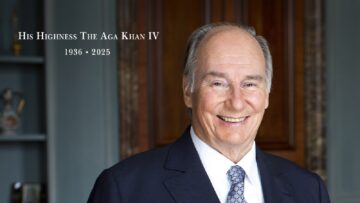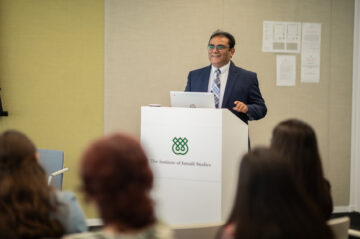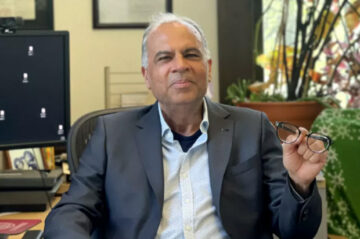This academic event corresponded with the UNESCO celebration of ‘World Philosophy Day’ in November 2009. International colloquia and symposia also took place in Moscow, Saint Petersburg and at the UNESCO Headquarters in Paris, as well as in Tehran and Hamedan.
By critically conceptualising the ‘impetus of philosophising in Islam’, Dr. El-Bizri’s paper focused on the fundamental question concerning the ‘renewal of philosophical thinking’ that is inspired by Islam as a vibrant lived faith and a rich intercultural sequence of civilisations. In this context, he drew a distinction between the philosopher who is motivated by the systemic unfolding of fundamental questions and concepts and the archiving exegete who is primarily bent on reporting them. This calls for rethinking some of the principal systems in ontology and epistemology in relation to the history of ideas in Islam.
Dr. El-Bizri sees this line of enquiry as an ‘exercise in thinking’, rather than a research project per se, and as one intellectual pathway amongst many others. In its epistemic possibilities, this study may potentially facilitate the founding of new modes of rethinking metaphysics and cosmology, while being inspired by intellectual history in Islamic civilisations. It is essentially oriented by lived and concretised aspirations in the unfurling of genuine philosophical thinking in relation to ‘Islam in the 21st Century’.
The conference and accompanying events were covered by Iran’s national media and press. The conference was concluded by a high-profile ceremony. The Minister of Science, Research & Technology, the Minister of Culture, the Director of the Academy of Sciences, Professor Reza Davari Ardakani, and the Institute of Philosophy, Professor Gholamreza Aavani, attended, along with various other Iranian dignitaries.
Prestigious awards were also granted to distinguished scholars for their contributions to the field of ‘philosophical studies in relation to Islam’. Award winners included Ayatollah ‘Abdallah Javadi Amoli, Dr Ali Akbar Velayati, Professor Seyyed Hossein Nasr and Professor Gholamreza Aavani.






